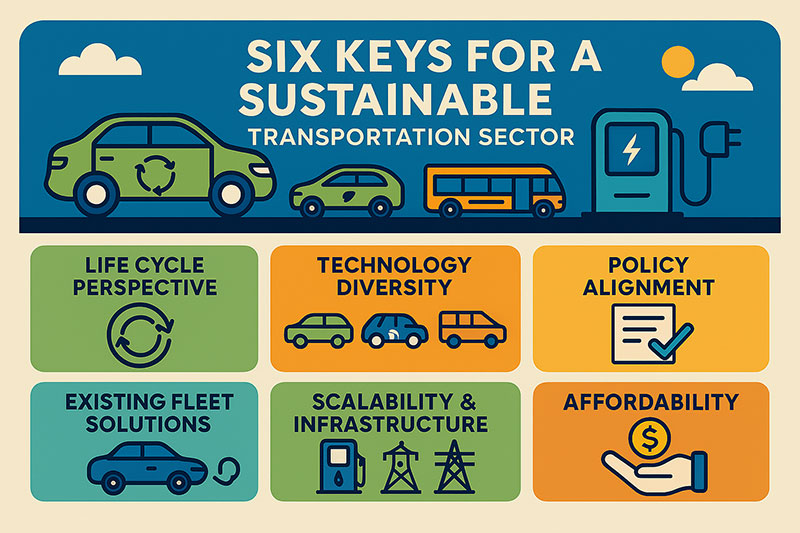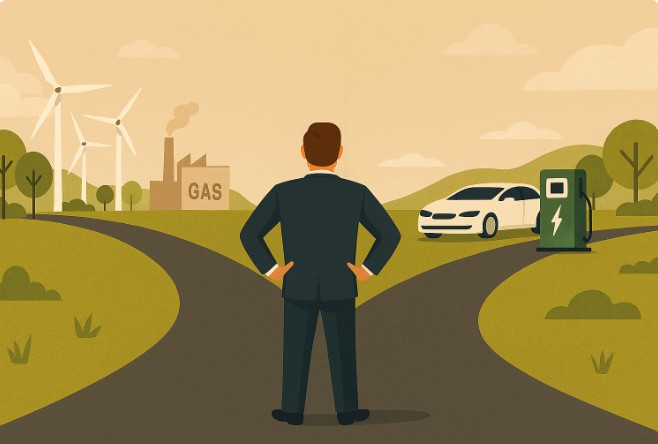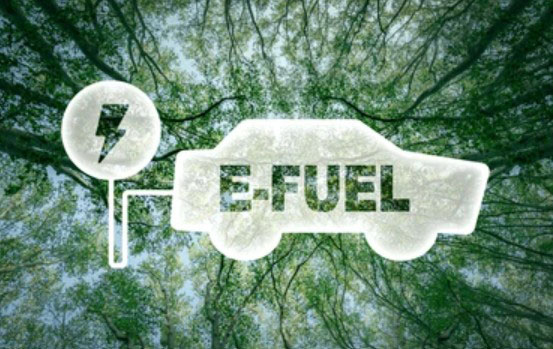April 19, 2021
With a goal of reducing transportation-related emissions as quickly as possible, what role will biofuels play with the existing 260 million vehicles on the road and the existing 140,000 gas stations that are selling liquid fuels today? We spent time with Jordan Godwin, Associate Director of Renewable Fuels at Oil Price Information Service to discuss the future outlook for the biofuels market.
Transcript
Hey, everybody. Welcome to Carpool Chats. My name’s John Eichberger of the Transportation Energy Institute. And today we’re going to talk about something that’s extremely important to the transportation market and that is the market for biofuels. We’re joined by Jordan Godwin who is the associate director for renewable fuels at Opus. And we’re going to talk about everything going on in the market. What the opportunities are, what are the challenges, what are the future and the outlook for the biofuels market, because I think it’s an important component of the transportation space. Jordan, thanks for joining us today. I’m really glad you’re here with us today.Jordan Godwin (00:29):
Yeah. Thanks for having me, John. Really honored to be on this podcast.
John Eichberger (00:33):
Yeah, it’s been great. You know, we were working in Opus for a long time, how long have you been with Opus?
Jordan Godwin (00:38):
Almost five years, it’ll be five years this [inaudible 00:00:41].
John Eichberger (00:40):
All right. And your specialty, your primary focus is on renewable fuels?
Jordan Godwin (00:45):
Exactly. Yeah, I started at Plats in the middle of 2012 I believe, and they threw me on biofuels. I didn’t know the first [item 00:00:52] when I started like a lot of people in biofuels, but I’ve been doing it for almost 10 years now. So I feel a lot of familiarity with these markets and obviously it’s a market that’s just constantly changing and dynamics and factors at play, new fuels, new opportunities. So there’s always something, it’s always fun to cover.
John Eichberger (01:16):
Well, we have something very much in common. I started working at Capitol Hill 23 years ago for an Iowa Congressman doing energy agriculture, environmental work. And I had to turn to the guy I was working with. He goes, do we support ethanol? He said, we’re from Iowa. I said, yeah, I don’t know what ethanol is. So even way back then, I had no idea what it was and I was representing somebody who represented farmers producing ethanol, trying to create markets for them. So it was really interesting.
John Eichberger (01:40):
You know, one of the things we’ve been talking about at the Transportation Energy Institute in 2021 is this whole idea of carbon. And there seems to be this, this drive by a lot of stakeholders that the solution to carbon mitigation in transportation has to be electrification. And even if you think electric vehicles are the number one solution long-term, which I think they’re part of the solution, they’re not the only solution, we’re going to have a long period of time where we’re going to be driving combustion engines for decades, burning liquid fuels. And I really think biofuels have an opportunity there to reduce the carbon intensity of a liquid fuel market. From what you’ve seen, what’s your thoughts on the whole role of biofuels in the carbon structure?
Jordan Godwin (02:20):
Yeah, fantastic question. So first off, the ethanol industry groups have done a much better job over the past three or four years of marketing themselves as being a low carbon option for years. I mean to defend those guys, basically they’ve had a moving target over the years. They had the food versus fuel debate, they had that it’s bad for your engine. They’ve had kind of a moving target of reasons that they’ve had to defend themselves, I guess. And now they’re kind of being labeled as the very green, pro EVs, electric vehicles, the hardcore green progressives, as not being environmental enough.
Jordan Godwin (03:08):
So basically you’ve really started to see that their positioning changed a little bit where they used to tout the fact that they reduce greenhouse gas emissions from gasoline by 30 to 40%. Now over the past few months even, you’ve seen more and more people pushing the conversation that ethanol can eventually be carbon neutral and perhaps even carbon negative through carbon capture, sequence duration, different kinds of methods that they can introduce. So I think they see the writings on the law and they want to make sure that they can present themselves as a very viable option, not just for the next five years, but for the next few decades to come.
John Eichberger (03:58):
It’s a comment that you made that I’ve never quite understood and I’ve heard it for years that, well, your solution just isn’t good enough, doesn’t go far enough. We’re in a situation where any progress in reducing the carbon emissions from the transportation sector has to be viewed as a success. It has to be viewed as something we need to pursue. So I’m glad to see that there’s getting some traction at least that any type of reduction in carbon in the transportation system is a positive development forward.
Jordan Godwin (04:26):
Yeah, absolutely. And it’s been kind of interesting also to see some of those ethanol lobbyists on the same stage at industry events that basically they’re lifelong enemies. The people from the oil lobbyists, API FTM. And then kind of sitting on the same stage and saying, ah, EVs are coming. We’re probably going to have to work together a little more than we used to. And we’re going to have to forge some kind of relationship to fend off these guys at least for a little while. So that’s also been a very interesting dynamic to see, because I think they’re both concerned that maybe a more progressive legislation would try and push them out of market, out of the market earlier than they obviously want to be pushed out.
John Eichberger (05:19):
I predicted that a couple years ago, I think I was actually at one of the major ethanol conferences giving a presentation. I said, guys, you’ve been fighting politically with the oil industry and [inaudible 00:05:30] for years, decades even. You know what? It probably is time for you guys to start holding the hands and realize that your real threat is not each other, your real threat’s electrification. And unless you guys get your act together, start working together to reduce the carbon intensity to the liquid fuels market, EVs are going to be pushed to the forefront. It’s nice to see that they were sitting on a stage together and saying, hey, you know what, let’s work together. It’s a nice development from as a former lobbyist who used to fight those all the time, seeing enemies start to hold hands, it makes me feel warm and fuzzy inside.
Jordan Godwin (06:03):
I know. It’s how you know true change is coming when enemies are being friends all of a sudden.
John Eichberger (06:09):
Exactly. So we talked a little about ethanol. Let’s talk a little bit about the diesel market. So you’ve got two products really emerging there, biodiesel’s been around a long time, but really recently, renewable diesel has just gained so much momentum. So what are you seeing happening in that sector?
Jordan Godwin (06:25):
That has been probably the hottest biofuels story to cover over the last year or two. Basically what you had for a few years, maybe five years, maybe around this time, you’ve had Neste producing a ton of renewable diesel in Singapore, and you had Valero and Darling come together for a joint venture to build a pretty big plant in Norco, Louisiana, near New Orleans. So those two facilities were cranking out a lot of renewable diesel, sending most of it to either Europe or California to take advantage of the low carbon fuel standard dollars there. And refiners started taking note of these quarterly earnings calls where Darling and Valero were saying, we’re making $2 or $3 a gallon on this stuff, making crazy margins at a time where, gasoline and diesel prices are very suppressed.
Jordan Godwin (07:21):
So all of a sudden over the past few months, you’re getting more and more refiners saying, oh, we want to do that too. We’re going to convert some diesel capacity to renewable diesel. And all of a sudden, it’s just off to the races over the last few months. Some of the proposals that we have out there, current capacity in the US is far less than a billion gallons a year, I think it’s around 600 million or so. And some of the proposals we have, have us going as high as 5 billion gallons a year in just three years, more than quintupling what we’re producing right now. So it’s a lot of changes coming in that market and a lot of it hinges on that California LCFS value add.
John Eichberger (08:09):
So let me ask, let’s talk about that a second, because I’ve been in the business a long time watching the biofuels market try to capitalize on some government programs to give them a little leg up, give them some accelerated growth opportunity. And if the renewable diesel growth market is predicated on government programs, how long term viable is that because ultimately, from a free market perspective, you’d want these programs to help them get established, help them grow, but ultimately have them generate their own return on investment, have them stand on their own two feet for long-term sustainability. What do you see in terms of the economics of renewable diesel, biodiesel and ethanol in the absence of government programs? Is there a future that?
Jordan Godwin (08:55):
That’s a fantastic question. The fact is, these fuels do need the support, from these government policies. And that’s why a lot of the refiners are having a sense of urgency about this, because for one, you have the $1 per gallon federal blender’s tax credit. So that goes to all biomass-based diesel. So that include biodiesel and renewable diesel. And that is currently set to expire at the end of 2023, I believe.
John Eichberger (09:28):
Yeah. And that’s been such a moving target for so long. It just doesn’t seem to have a lot of consistency.
Jordan Godwin (09:33):
So it almost every year, it was year in year out, bio-diesel producers were biting their nails at the end of the year, hoping for a Christmas present from Congress. And they finally gave him a little bit of certainty, I believe last session or a little over a year ago now, where they say, okay, we’re going to send you guys out to 2023 and that’s going to be it. But we’ve already heard the conversations starting like oh, how much can we extend it out next time? So you have that dollar per gallon credit. You also have the RIN value, which obviously fluctuates a tremendous amount. Right now, it’s very healthy and very good for the [inaudible 00:10:14] renewable diesel producers. But there have been times where that wasn’t there. And then lastly, you have that LCFS.
Jordan Godwin (10:20):
So California is humongous, it’s a humongous diesel market. And the beautiful thing about renewable diesel is that it can pretty much be blended up to 100%. It’s chemically identical to traditional ULSD. It’s not like biodiesel where you may have issues above B5 or maybe a B20 blend in some engines. So there is a lot of room to grow there, but everyone who’s getting into renewable diesel knows that you need more help beyond California. So we’re looking at other states bringing on similar programs. We have Oregon already has a program in place. Washington is working on one, New Mexico is working on one and not to mention there has even been some push at trying to look at a national LCFS at the end of the Biden administration. So like you said, a lot of this revolves around the policy that supports these fuels. Definitely.
John Eichberger (11:20):
Well, I think the federal biofuels policy is going to evolve and we’ve got the statutory volumetric provisions on the renewable fuel standard. They are done next year and it kicks over EPA to set the volumes on their own. A lot of people aren’t real comfortable with that. So I think Congress is probably going to taking a look at the biofuel programs and LCFS at the federal level is definitely on the table. And I know that there’s been some discussion about that, which will be an interesting dynamic, but let’s go back. You mentioned, you talked about biodiesel a little bit and I’ve talked to quite a few people and what I’m hearing anecdotally is that we’re selling lot of B20 in the market, that the volume of higher blends of biodiesel has really expanded last couple of years. From the data you’ve seen, are you seeing those trends as well? Or is it kind of anecdotal stuff that we have to rely on?
Jordan Godwin (12:05):
Yeah, I’d say we’re definitely seeing that in the Midwest and maybe a little bit, I’m not sure in California to be honest, but we’ve definitely seen that in the Midwest. I know Minnesota has done a great job of pushing their statewide biodiesel mandate and we’ve seen much stronger blends there, but it’s kind of awkward too, because you mentioned these increased blends and more engines out there that can run on B20. But all of a sudden you have renewable diesel coming along and again, not to bring up that topic again, but renewable diesel tends to be a much more attractive option. It’s almost like that meme where the guy’s walking with his girlfriend looking over his shoulder at the other girl walking by. So the renewable diesel right now, unfortunately, is that other girl. Just there kind of like.
John Eichberger (12:59):
Yeah. Let’s go back quickly to ethanol because again, I’ve been dealing with ethanol for a long time. The renewable fuel standard was set up for four different categories of qualified biofuels, one being advanced biofuels, cellulosic ethanol. That has been the waiver category for EPA for years because it hasn’t been enough volume. I had a conversation not too long ago where somebody said, I looked at some numbers and we’re cranking. There’s a lot of cellulosic ethanol being produced now. Where do you see that market going? Because quite frankly, if cellulosic ethanol can get the breakthrough and production and commercialization that it needs to, the impact on carbon is going to be significant. So are we seeing an opportunity for cellulose to start kind of coming into its own and being a viable fuel product?
Jordan Godwin (13:47):
I’ll be honest, it’s been a little while since I cranked into those D3 cellulosic numbers. I’ve been under the impression that it’s still heavily driven by the renewable natural gas that generates those D3s now, so not technically cellulosic ethanol like Congress envisioned when they started. I know we’ve seen a lot of ethanol producers taking advantage of corn kernel fiber, being able to produce just incremental amounts of cellulosic ethanol at their plants kind of side by side with their traditional operations. I know a lot of plants have taken that on, but yeah, like you said, that was always the dream of the RFS that, it could lean on ethanol and biodiesel until cellulosic ethanol got off the ground. But we just, like you said, haven’t seen that huge commercial success to this point.
John Eichberger (14:44):
Yeah. You mentioned renewable natural gas. Is that growing pretty fast? I remember a year and a half, two years ago at our last conf before the pandemic, we had UPS join us and give a presentation to the Fuels 2019 audience. And he made an announcement then about their huge purchase of renewable natural gas supplies for the natural gas fleet. What are you seeing in that space?
Jordan Godwin (15:03):
Yeah, absolutely. I think I looked at those numbers the other day and I believe in 2020 it more than doubled 2019, and then in 2021, it’s probably going to be right around that same pace of growth. So we’re seeing a ton of new projects, almost every day it seems like there’s a new announcement of some new joint venture, some new project. And a lot of that, as long as you’re injecting into a pipeline where you can prove that it’s going to California, you reap those benefits and the benefits are lucrative for a lot of, especially those dairy guests, RNG.
Jordan Godwin (15:41):
But even the biggest RNG producers will tell you that there is a capacity ceiling that they need to work with. I think a lot of the hope now is hinging on obviously trying to introduce new vehicles that will maybe use it and infrastructure that’s a pretty big step. But what you’ve also seen is some renewable natural gas producers setting up EV chargers, basically saying we’re going to use our renewable natural gas, our very low carbon intensity fuel to basically charge electric vehicles. And I think that seems to be the direction I think we’ll likely be headed in the long-term.
John Eichberger (16:23):
I would assume that it would also generate ERNs once EPA gets that set up, LCFS credit so there’s a double play there between marketing the RNG, but also getting some credit to the programs.
Jordan Godwin (16:34):
Yeah, absolutely. I hadn’t heard that ERNs in a few months now, that thing’s been sitting there for four to five years now, I think. And maybe I think some of those people are helpful that under the Biden EPA, they’ll take a stronger look at it and consider it better than they had under the Trump administration.
John Eichberger (16:57):
Well, from what we’ve talked about, it sounds like there are options to have an effect on the emissions profile and the carbon intensity of the product market even before we start going to electrification. And hopefully, hopefully that this discussion can keep at the top of the list because we cannot put all of our eggs in one basket. We cannot just sit back and wait for the electric vehicles to save the world if we really think the world is crumbling around us. We need to pursue these options. And I really appreciate you joining us Jordan, because I think you’ve given a good perspective that there’s stuff happening out there and there’s opportunities there that we should not ignore. We have to do everything we can to take advantage of what’s available to us. And hopefully people will watch this program and get an idea of what those options are and start pursuing them a little more aggressively.
Jordan Godwin (17:44):
Yeah, absolutely. I’m a huge nerd for all this stuff, so I’m happy to share some of the interesting dynamics that are out there and really, again, honored to be able to talk to you on this podcast and really appreciate it.
John Eichberger (17:56):
Well as one nerd to another, I appreciated the conversation and really thank you for joining us and we’ll talk to you soon. Everybody out there. Thank you for joining us for Carpool Chats and we’ll see you next time.





